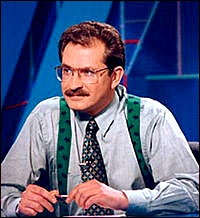 Vladislav
Listiev Vladislav
Listiev
For many years Vladislav Listiev (1956-1995) was
Russia's most popular talk show host and its most successful
TV producer.
His TV shows, such as "View", "Subject",
"field of Wonders" and many others are still loved
by the audience.
It's hard to imagine that Vladislav Listiev, a glamorous,
well-spoken, loved by everyone famous journalist and a TV producer
had such a tragic life.
His father committed a suicide when Vladislav was
still in school. His mother was constantly drunk and Vlad,
who was studying at the special school for athletes, didn't
hurry back home on the weekends.
Here, at the school, he met his first love Elena. In
1977 they got married and Vlad moved in with Elena and her
mother in their small apartment.
It wasn't an easy life for the newly wed couple. Vlad
was studying journalism at the Moscow State University and
worked part-time as a personal trainer. Soon his first son
was born. Unfortunately, due to poor health, he didn't live
long.
His wife was in a deep depression. They were arguing
a lot. Vlad was so devasted by everything that was happening
in his life that he even tried to commit a suicide. He left
his wife when she was pregnant second time, saying that he
is not a father of the expected child.
The break up with Elena wasn't easy. Vlad was supposed
to go to South America for a journalist assignment. Elena
found out about it and let his boss know that Vlad left his
pregnant wife. Vlad not only lost his trip to South America,
he was also fired.
For 2 years he was making living by writing articles
about different sports events as a freelance journalist. During
Moscow Olympics Vlad met Tatiana, a University student, who
later became his second wife. The boy that was born in the
second marriage also died at the age of 6. After that, Vlad
leaves Tatiana, tries to end his life again and then drinks
heavily for years.
In 1987 Vlad became a host of the new, very popular
program "View". To everyone Listiev was a rising
star on Russian TV. He was smart, funny, politically incorrect
and adored by viewers. Only his close friends and colleagues
knew about his personal problems. His friends from ORT don't
like to remember the time, when Vlad would show up drunk,
almost unconscious, at work and they would have to make him
presentable for the live show minutes before the start. Who
knows what would have happened with Vlad and his career, if
he didn't meet Albina at that time.
|
|
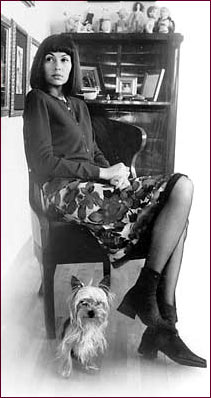 In
2 years they quietly got married and Albina, a 25 year old
interior designer, quit her work and dedicated her life to
Vlad. She followed her husband everywhere 24/7, ensuring his
sobriety. Most people think that only because of her efforts,
Vlad stopped drinking and became a number one talk-show host
and producer on Russian TV. In
2 years they quietly got married and Albina, a 25 year old
interior designer, quit her work and dedicated her life to
Vlad. She followed her husband everywhere 24/7, ensuring his
sobriety. Most people think that only because of her efforts,
Vlad stopped drinking and became a number one talk-show host
and producer on Russian TV.
In early 1995 Listiev was named head of the reorganized
Channel 1, Russia's biggest nationwide privatized TV network,
now known as ORT (Russian Public Television). He also became
a president of the new independent TV company called "View".
The government kept 51% of ORT; a group of well-connected
businessmen got the rest. Leading businessmen was Berezovsky,
who acquired 16% of the stock for a mere $320,000.
|
|
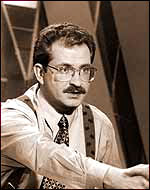 Listiev
had no intention of being a figurehead. He decided to clean
up the network's unsavory connections. His main target was
Sergei Lisovsky, a 36-year-old advertising man who made his
first fortune from a chain of Moscow discotheques. These glittering
dives were known as good places to procure drugs. They were
a haunt of Russia's crime bosses. Listiev
had no intention of being a figurehead. He decided to clean
up the network's unsavory connections. His main target was
Sergei Lisovsky, a 36-year-old advertising man who made his
first fortune from a chain of Moscow discotheques. These glittering
dives were known as good places to procure drugs. They were
a haunt of Russia's crime bosses.
From discos, Lisovsky moved into advertising. To buy
time on any of the top five Russian TV channels you must go
through Lisovsky or an allied company. Here, as in cars and
airline tickets, the middleman seems to have captured the
float. This year advertisers will pay about $80 million to
buy time on ORT. The money goes first to the media sales company,
which then pays the network. But companies like Lisovsky's
Premier SV were keeping most of the money while government
subsidies (some $250 million) were keeping the TV network
operating.
|
|
Lisovsky's business has been connected with some unsavory
characters. One of Premier SV'S founding shareholders, Sergei
Antonov, has been arrested by the Moscow police on racketeering
charges. The chief financial officer of Premier SV, according
to police investigations, is Alexander Averin, known in the
underworld as "Avera Junior," Averin is important
for his family connections — his older brother, Viktor,
a boss of the notorious Solntsevo Gang, who was recently arrested
on money laundering charges in Switzerland.
This was the crowd that Vladislav Listiev, the TV
producer, decided to take on.
On Feb. 20, 1995 Listiev announced that he was breaking
Lisovsky's advertising monopoly and instituting a temporary
moratorium on advertising until ORT could work out new "ethical
standards." This was a very brave move. Advertising
companies started to loose millions of dollars.
"I knew he would be killed
- the people he was dealing with were totally criminal,"
says one close friend of Listiev's.
Two weeks later, around 10 in the evening of March
1, 1995, Listiev was gunned down by professional assassins
at the entrance to his apartment building. That was the
loudest custom-made murder in a history of modern Russia,
that shocked the nation. Vlad Listiev was only 34.
|
|
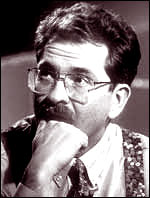 Forbes
Magazine has obtained documents on the case from the organized
crime unit of the Moscow police department. Forbes
Magazine has obtained documents on the case from the organized
crime unit of the Moscow police department.
According to these documents, Listiev knew that he was
a marked man. He knew law enforcement authorities in Russia
are powerless against the kind of opposition he faced. So
Listiev gathered a group of his closest friends and explained
the reason he might be killed.
When Listiev announced that he would be ending the
advertising monopoly, Lisovsky demanded $100 million in damages.
Listiev found a European company (name undisclosed) willing
to buy the ORT advertising franchise. Listiev asked Boris
Berezovsky to act as transfer agent and hand over the $100
million to Lisovsky. Berezovsky took the cash and stalled
Lisovsky; he would get his money in three months, Berezovsky
explained.
Thus the reforming Listiev was caught between two
ruthless characters. He paid with his life.
The public outcry over Listiev's death was immense.
Thousands of mourners showed up at his funeral. All TV channels
stopped But the subsequent investigation was a tragic farce.
Listiev's murder has never been solved.
Five months later the federal prosecutor's office
announced that it had closed the Listiev case, and identified
the names of both the people who ordered the killing and those
who had carried it out. The very next day the prosecutor's
office recanted, saying that the investigation was continuing.
Two months later the prosecutor-general was fired and thrown
in jail on charges of corruption.
Hundreds of bankers, businessmen and journalists have
been killed since that time too. The price of a contract
murder in Russia today is said to be $2,000. The murderers
are almost never caught; and when someone is arrested,
no one can be sure whether the police have apprehended the
guilty party or are simply settling scores.
Lisovsky and Berezovsky both denied that they had anything
to do with Listiev's killing. They blame unnamed advertising
and production companies that were being hurt by Listiev's reorganization
of the network.

|
|
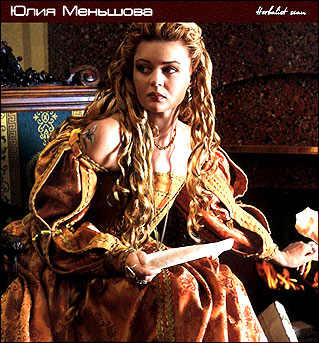
Julia Menshova, TV host of the
popular Russian program "By Myself". |

|
|
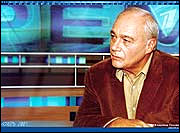 Vladimir
Pozner Vladimir
Pozner
Vladimir Pozner is a popular Russian TV journalist,
the host of the political program "Times" on ORT.
He has won multiple Soviet, Russian, and American awards,
including two Emmy certificates; its Russian equivalent, the
Tefy award; He is also internationally recognized and ranks
among the most respected people in the television profession
in Russia today.
Vladimir Pozner was born in 1934, in Paris, France.
He moved with his family to NY in 1940 where he lived until
late 1948, when his family moved to the Soviet-occupied zone
of Berlin. In 1952 the family moved to Moscow, where he enrolled
at Moscow State University and graduated with an M.A. in biology.
Between 1958 and 1961 Pozner worked as a translator of Elizabethan
poetry into Russian. In 1961 he joined Novosty Press Agency
as a senior editor, later becoming executive editor of Soviet
Life and then Sputnik magazine.
In 1970 Pozner joined the USSR State Committee for
TV & Radio as a commentator, where he worked until 1986.
During that period, Pozner began to appear on US network television
shows, mainly on Nightline (ABC), but also on a variety of
other shows on NBC, CBS, CNN, as well as the CBC, the BBC,
and television networks in France and Japan. It should
be noted that Pozner was denied travel rights by the Soviet
authorities - all the shows were done via satellite hookup.
In the 1980s, he did a series of historic live "space
bridge" people-to-people talk shows with Phil Donahue
which were enormously popular and earned Pozner cult status
in his country. The first, called "A Citizen's Summit,"
ushered glasnost into Soviet TV and was supported by President
Gorbachev. Pozner was promoted to the rank of political
observer, the top journalistic post in the USSR. Genuine talent
and extensive knowledge of Vladimir Pozner made him a role
model for many young journalists in Russia.
With the advent of perestroika and glasnost, Pozner
was allowed to travel (he had been let out of the country
for a brief period between 1977 and 1980, but his passport
was revoked in that last year when he criticized the Soviet
military incursion in Afghanistan).
In 1989 Pozner resigned in protest from the Communist Party
and in 1991 resigned from the State Committee of Television
and Radio because of what he considered censorship.
That same year Pozner moved to New York City to work
on a television show with Phil Donahue (Pozner & Donahue),
which was first aired on WWOR and then on CNBC.
|
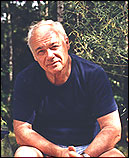 In 1990 The Atlantic Monthly Press published Pozner's
book, "Parting With Illusions",
which became a national bestseller and was on The New York Times
list for 12 weeks. A second book, "Eyewitness",
a journalistic report on the failed coup of August 1991, was
published by Random House in 1992.
In 1990 The Atlantic Monthly Press published Pozner's
book, "Parting With Illusions",
which became a national bestseller and was on The New York Times
list for 12 weeks. A second book, "Eyewitness",
a journalistic report on the failed coup of August 1991, was
published by Random House in 1992.
In early 1997 Pozner returned to Moscow. He hosted two
highly rated television shows on Russia's most widely watched
network, ORT. In the fall of 2000 he began hosting an end-of-the
week political analysis show called "Times", which
is presently ranked number one in Russia in the genre.
|
He is married to Katherine
Orlova and has two children -------------------------------------------------------------------------------
Where do you think American supremacy
comes from?
Americans are interested only in
themselves, that's a fact. However, Americans are not the
only nation which thinks that it is perfect. There is a joke:
the French do not think that France is the best country in
the world. They know it.
This is the combination of the feeling
of supremacy and ignorance. America is a wonderful country.
It has achieved amazing progress. No-one denies that... I
would not like to make general statements, but the majority
of Americans believe that it is so very supreme, which makes
any kind of anti-American criticism absolutely out of the
question. This is the way the American mindset is. This is
what American movies, television and schools teach.
Americans have a wonderful legacy. They ought to be proud
of it. However, a few people know something about that legacy.
Common Americans do not read much, so they do not know a lot
of their own history. Nevertheless, they believe that whatever
the USA does, it is correct.
Why did the Vietnamese war cause
such great damage? It was not caused by the fact that Americans
lost it. The problem is that they were not right. They defended
something wrong. That
is why they perceive Iraq as evil, which threatens them. They
do not ask themselves in which way such a small country as
Iraq might threaten them. They are certain that Saddam Hussein
has to be removed for the happiness of all the Iraqi people.
This is a very American way of being, so to speak.
To read full interview with V. Pozner click
here.
 Listen
to Pozner's interview with Walter Cronkite Listen
to Pozner's interview with Walter Cronkite
Walter Cronkite and Vladimir Pozner hold a frank discussion
on the history of media repression in the Soviet Union, the
relative freedom of the American press, and President Putin's
controversial press policies.
|

|
Links
The story
of Vlad Listiev, why
Listiev was killed, how
Listiev was killed, article
about Listiev's personal and professional life, article
"Two yars without Vlad", about
tv program "View", ORT
official website, TV
Center (in Russian), tv
gallery, "The
Russian Project", interviews and articles about life
in Russia after the collapse of the Soviet Union (in English) |
|



